Search Results
Showing results 1 to 20 of 32
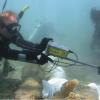
Excavating and Mapping Under Water
Source Institutions
In this archaeology activity, learners consider ways in which excavating an underwater site is different from excavating a terrestrial site.

Arctic Sea Ice
Source Institutions
In this activity, learners explore how the area of Arctic sea ice has changed over recent years. First, learners graph the area of Arctic sea ice over time from 1979 to 2007.
Coastal Erosion: Where's the Beach?
Source Institutions
Learners use beach profile data from a local beach or online data from Ocean City, Maryland to investigate coastal erosion and sediment transport.

The Carbon Cycle and its Role in Climate Change: Activity 3
Source Institutions
In this activity, learners explore the human influences on the carbon cycle and examine how fossil fuels release carbon.
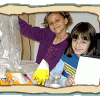
If Trash Could Talk
Source Institutions
Ancient trash tells archaeologists a lot about the past. In this activity, learners take a close look inside their trash can and think about the clues it offers about their lives.
The Earth's Timeline
Source Institutions
In this group activity, learners will mark important developments of life on Earth on a timeline (each foot in length representing 200 million years).

Relative Speed of Dinosaurs
Source Institutions
In this activity, learners interpret three trackways and use measurements and a formula to infer the relative speed of dinosaurs.

Digging Into the Past
Source Institutions
This activity (on pages 23-27) lets learners simulate the work of scientists who take core samples of Earth's rocky layers to determine geological history.
Crater Maker
In this activity (on pages 6-11), learners work as a team to investigate how impact craters on Earth, the Moon or other planets take shape and what patterns they make.

Mapping Greenhouse Gas Emissions Where You Live
Source Institutions
In this lesson plan, learners examine some of the of greenhouse gas emissions sources in their community.
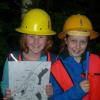
Tree Growth Investigation
Source Institutions
This activity (located on page 3 of the PDF under GPS: Temperate Rain Forest Activity) is a full inquiry investigation into tree growth rates.

Create Your Own Time Capsule
Source Institutions
In this archaeology-related activity, learners build their own time capsule and choose a storage location and a date to reopen it.
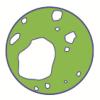
Sand Grain Observations
Source Institutions
In this activity (on page 1 of the PDF under SciGirls Activity: Earthquakes), learners will use a magnifier to carefully examine samples of sand from different locations.

The Carbon Cycle and its Role in Climate Change: Activity 2
Source Institutions
In this activity (on page 7), learners explore the meaning of a "carbon sink." Using simple props, learners and/or an educator demonstrate how plants act as carbon sinks and how greenhouse gases cause
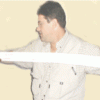
Personal Time Line
Source Institutions
In this activity, learners work in groups to create a time line representing significant moments in their lives.
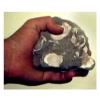
Match Rock
Source Institutions
In this activity, learners try to figure out who has their matching rock type by reading a description of their rock (no talking!).

Tomb Mapping
Source Institutions
In this activity, learners examine the culture and history of the tomb site.
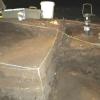
Looking Back Through Time
Source Institutions
In this activity, learners create their own archaeological profiles.
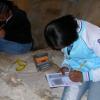
Fossil Age Estimation Model
Source Institutions
In this activity (page 1 of the PDF under SciGirls Activity: Dinosaurs), learners will model how paleontologists estimate the age of fossil discoveries by extracting “fossil” playing cards from newspa

Who Dirtied The Water?
Source Institutions
In this activity, learners receive a labeled plastic film canister containing a material representing a pollutant (i.e. pencil shavings = a beaver's wood chips).
